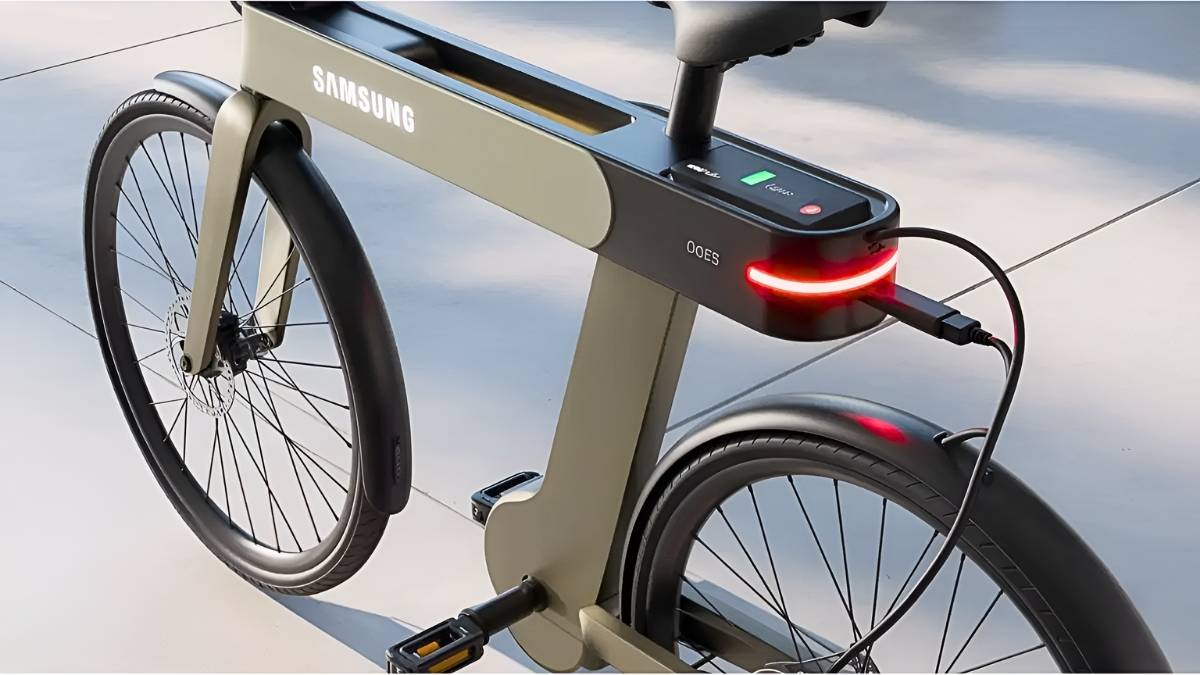Samsung, a company widely known for its innovations in smartphones, televisions, and batteries, has once again expanded its technological ambitions. According to recent patent filings, the tech giant is exploring the development of a foldable electric bike that promises to redefine urban mobility. One of the most exciting features revealed in the patent is its ultra-fast charging capability, allowing the battery to reach a full charge in just 30 minutes. While electric bikes are already popular for their convenience and eco-friendliness, combining foldability with rapid charging could make commuting and city travel significantly more practical.
The concept of a foldable electric bike is not entirely new, but what sets Samsung’s approach apart is its integration of cutting-edge battery technology and compact design. This bike is expected to appeal to urban commuters, travelers, and anyone seeking a portable yet powerful electric ride. The idea reflects Samsung’s interest in leveraging its expertise in battery management, materials, and smart devices to create mobility solutions that go beyond traditional consumer electronics.
The Foldable Design Advantage
Foldable electric bikes have become increasingly popular because they address one of the main challenges of urban commuting: storage. Apartments, offices, and public transport often limit space for full-sized bikes. Samsung’s foldable e-bike design aims to solve this issue by allowing the bike to collapse into a compact form factor that is easy to carry and store. The patent suggests a lightweight frame with durable materials that maintain strength while reducing overall weight, making it convenient for daily commuters.
The foldable design also provides flexibility for mixed-mode commuting. Riders can cycle to a train or bus station, fold the bike, and continue their journey without worrying about parking or theft. By making portability a priority, Samsung is targeting urban riders who value efficiency and convenience, especially in densely populated cities where space is at a premium.
Ultra-Fast 30-Minute Charging
Perhaps the most remarkable feature revealed in Samsung’s patent is the bike’s ultra-fast charging system. A full charge in 30 minutes is significantly faster than most current electric bikes, which typically require several hours to recharge. This fast charging capability could drastically reduce downtime for riders, making the bike more practical for frequent use.
The patent suggests that Samsung will leverage advanced lithium-ion battery technology, potentially similar to the batteries used in its smartphones and high-performance laptops, but scaled for e-bike requirements. Efficient power management systems will allow the battery to charge quickly while maintaining safety and longevity. Rapid charging could make the bike suitable for spontaneous use, enabling commuters to plug in during short breaks and resume their journey without delay.
Potential Performance and Range
Although the patent does not provide detailed specifications, it hints at impressive performance capabilities. The combination of a high-voltage battery and lightweight foldable frame could provide enough torque and assistance to handle city streets, moderate hills, and longer commutes. Samsung’s experience in energy management suggests that the bike will optimize power consumption, balancing speed, efficiency, and range.
A 30-minute charging time combined with a lightweight design would make the bike appealing not only for commuters but also for leisure riders. With a potential range comparable to current high-end electric bikes, riders could enjoy longer trips without worrying about battery depletion. The use of foldable frames and high-efficiency motors also suggests that Samsung aims to create a product that blends practicality with performance.
Smart Integration and Connectivity
Samsung’s electric bike is likely to feature smart connectivity, given the company’s expertise in electronics and IoT devices. Potential integrations include mobile apps for battery monitoring, route planning, and ride tracking. Riders could receive real-time data on battery status, distance traveled, and energy consumption. Smart features may also include regenerative braking, allowing the battery to recover energy during downhill rides, further extending range.
Connectivity could also enhance safety and convenience. For example, the bike might include GPS navigation, theft alerts, or integration with smart city infrastructure. Samsung’s approach may position the bike as more than just a transportation device, turning it into an intelligent mobility solution that interacts with the environment and the rider’s digital ecosystem.
Market Implications
If Samsung brings this foldable electric bike to market, it could have significant implications for urban mobility. The combination of portability, fast charging, and smart features would address many pain points for city commuters. It could also push other manufacturers to innovate, accelerating the adoption of more efficient, compact, and connected electric bikes worldwide.
The timing is ideal, as cities continue to prioritize sustainable transportation options. Electric bikes reduce traffic congestion and emissions while providing a flexible alternative to cars and public transport. Samsung’s entry into this segment could bridge the gap between high-tech consumer electronics and practical, everyday mobility solutions.
Key Highlights
• Samsung is developing a foldable electric bike designed for urban mobility.
• The bike features an ultra-fast charging system that fully charges in 30 minutes.
• Lightweight foldable frame improves portability and storage convenience.
• Advanced lithium-ion battery technology provides performance, safety, and efficiency.
• Smart connectivity features may include mobile apps, GPS tracking, and ride monitoring.
• Potential to redefine city commuting and promote sustainable transportation.
Final Words
Samsung’s foldable electric bike concept represents a compelling blend of innovation, practicality, and sustainability. By integrating a foldable design with a high-performance battery capable of full charging in 30 minutes, the company addresses many of the limitations of current electric bikes. Urban commuters could benefit from a device that is easy to carry, quick to charge, and equipped with smart features that enhance convenience and safety.
While the bike remains in the patent stage, the ideas presented showcase Samsung’s commitment to expanding its technology ecosystem beyond traditional electronics. If successfully launched, this electric bike could set a new benchmark for foldable and fast-charging e-bikes, influencing the future of urban mobility and demonstrating how technology can transform everyday transportation.
